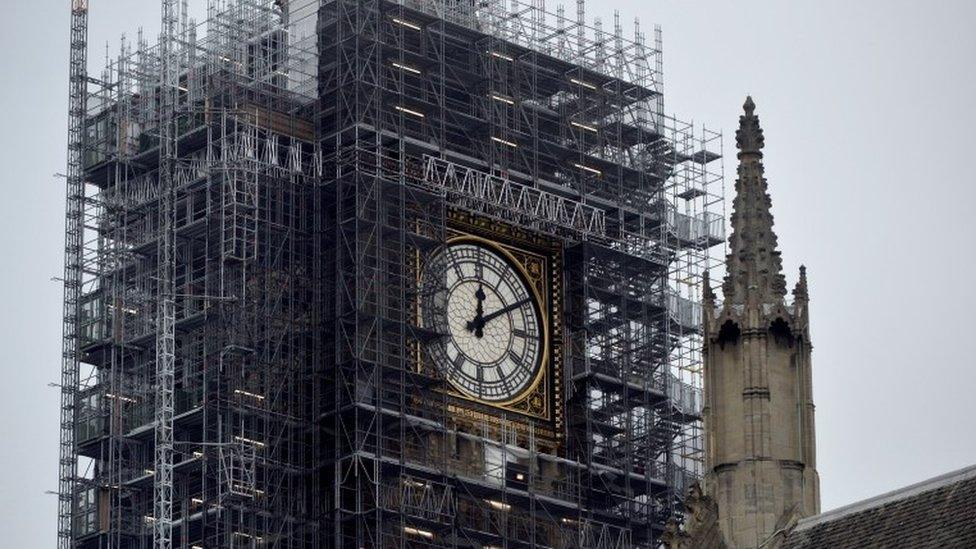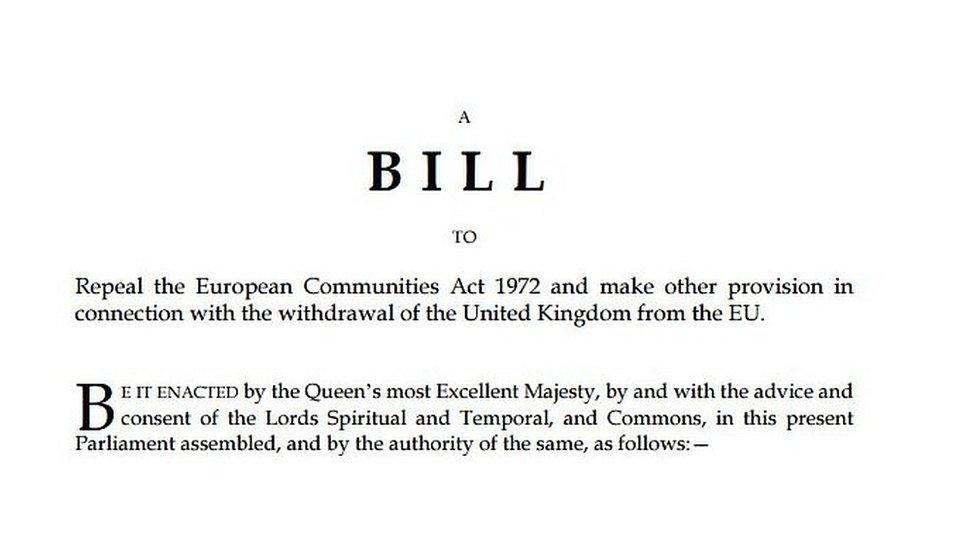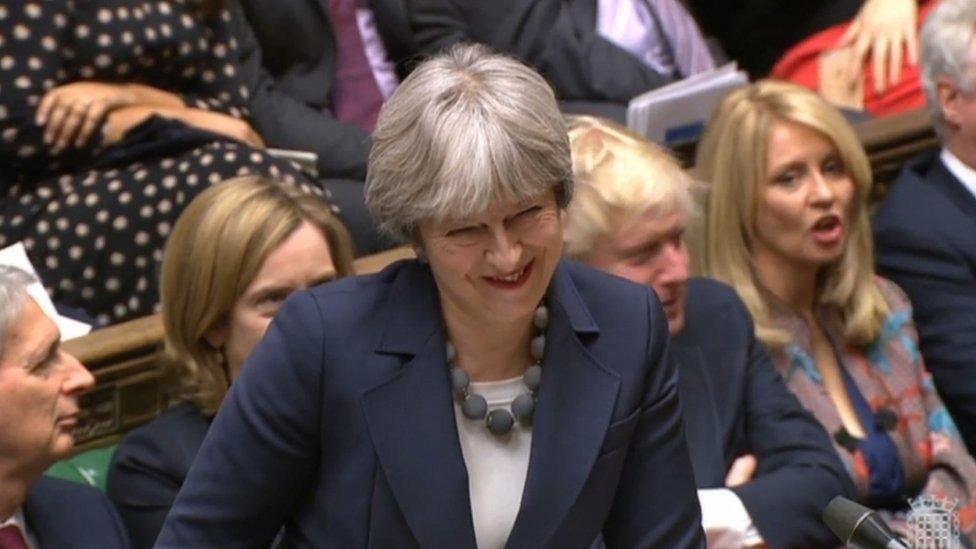The week ahead in Parliament
- Published
- comments

The EU Withdrawal Bill is back - complete with what could escalate into a nasty row over the non-appearance of promised government amendments to ensure powers are passed to the devolved parliaments "without touching the sides".
The powers cover agriculture, fisheries, environmental and energy issues currently regulated through the EU - and the failure to produce the amendments promised by the Scottish Secretary David Mundell has infuriated the SNP, in particular.
The government has promised they will be added to the bill in the Lords, but the lack of Commons debate on them has led to bitter complaints and suspicion that ministers are about to renege.
Brexit bills to dominate parliament in 2018
Elsewhere, keep an eye out for the sudden appearance on the agenda of a motion to appoint the former boss of the MPs' expenses regulator, IPSA, Sir Ian Kennedy to the Electoral Commission. Sir Ian, to put it gently, is not popular with MPs and the delegated legislation to appoint him has now been objected to twice.
This means the government will have to find time to debate the appointment on the floor of the House. Under Standing Order No 16, this debate could last up to 90 minutes. And it could be quite an occasion, from a number of points of view.
Here's my rundown of the week ahead:
Monday
The Commons opens (2.30pm) with Defence questions - where recent reports about possible cuts to the armed forces are bound to surface.
It's a fair bet that they may also be followed up by an urgent question; Conservative ex-Army officer Johnny Mercer is requesting a UQ, and Defence Committee Chair Julian Lewis may follow suit.
The day's main debate is on the second reading of the Space Industry Bill, external - which provides the legal framework for a British space port. This will provide the first outing for the reshuffled Transport Minister, Jo Johnson, boldly going where no Commons minister has gone before.

Xanax is not available on the NHS
The adjournment debate, led by Labour's Bambos Charalambous is on the misuse of Xanax. He says Xanax, a powerful and addictive tranquiliser that's not available on the NHS, is being misused by young people. Some are self-medicating to cope with anxiety, while younger teenagers are being groomed and exploited by drug-pushers taking advantage of the drug's 'zombie-like' effects.
He wants the government to research its use, raise public awareness and put support in place for those who have developed a dependency.
In Westminster Hall (4.30pm) there will be a debate on e-petition 200585, external "Keep Childcare Vouchers open beyond April 2018". The petition says that hundreds of thousands of parents will lose out under the new tax-free childcare. The voucher schemes should be kept open alongside tax-free childcare to give parents a genuine choice for the support that best suits their family.
The government response is that tax-free childcare is one element of its childcare support policy and is fairer and better targeted than vouchers. The petition has attracted 115,813 signatures.
My committee pick is the Transport Committee hearing (4.45pm) on the Airport National Policy statement - with the focus very much on the expansion of Heathrow Airport. It hears from Cllr Paul Hodgins, leader of Richmond Upon Thames Council, and Brendon Walsh, chairman; as well as Joseph Carter, chairman of the Transport sub-group, Heathrow Strategic Planning Group; Val Shawcross, Deputy Mayor of London for Transport, and Alex Williams, Director of City Planning, Transport for London; Parmjit Dhanda, Executive Director, Back Heathrow; John Stewart, chair, Heathrow Association for the Control of Aircraft Noise, and Stephen Clark, member of Heathrow Community Noise Forum and Teddington Action Group (at 5.45pm).
In the Lords (2.30pm) the first business is the introduction of a new member, the Lord Bishop of Chichester, the Right Reverend Dr Martin Warner.
The day's main debate is on the detail of the Sanctions and Anti-Money Laundering Bill, external - the first of two report stage days.
The key issues concern the sanctions regime. One vote expected, fairly early in the day. The dinner break mini-debate is a regret motion from Labour's Baroness Jones on water abstraction.
Tuesday
The Commons opens (11.30am) with Treasury questions, followed by a Ten Minute Rule Bill from the Conservative, Henry Smith, to allow people descended from individuals born in the British Indian Ocean Territory to register as British overseas territories citizens.

The MPs return to the detail of the European Union (Withdrawal) Bill, external - with the first of two days of report stage debate. Ministers have tabled a series of amendments that will limit their powers to use so-called Henry VIII powers, external to amend EU rules and regulations when they are transferred onto the UK statute book.
EU Withdrawal Bill: documents, external
Labour offer an amendment to protect EU-derived employment and other rights, and there are a number of amendments revisiting the committee stage battles about allowing the EU Charter of Fundamental Rights to continue to apply domestically in the interpretation and application of retained EU law.
Meanwhile, the band of pro-EU Labour backbenchers around Chris Leslie and Chuka Umunna have several amendments down: one calls for the government to set out the full details expected of a post-Brexit trade agreement with the EU; another would require that the agreed methodology for calculating the financial settlement between the UK and the EU is published; they also want ministers to publish a summary of the government's legal advice on whether the UK's Article 50 notice of withdrawal can be revoked; and they have an amendment requiring a parliamentary vote on the alternative of remaining in the EU single market and customs union.
There's a cross-party new clause to transfer the EU protocol on animal sentience into UK law and a Lib Dem amendment which has attracted some Labour support setting out how a "meaningful vote" on "deal or no-deal" would work, which concludes with the requirement that if Parliament does not agree to the final agreement, or to no deal, then the government must request a revocation or extension of Article 50.
I'm not sure any amendments have the head of steam behind them to get past government opposition - many seem to be more about political positioning by parties or factions. But some may tee up possible amendments in the Lords - and the next big Commons challenge over this bill may come when it returns from the Lords, laden with booby-trap amendments attached by pro-EU peers.
But that won't be until towards the summer, or even later.
The day's Westminster Hall debates include: the Conservative Maggie Throup on the effect of junk food advertising on obesity in children (9.30am-11am). She chairs the All Party parliamentary Group on Obesity, and she will press the government to extend the ban on TV advertising for fatty and sugary foods which currently operates during children's programmes, right up to the 9pm watershed.
In the debate on food poverty in Merseyside (2.30pm-4pm) Labour's Stephen Twigg will be relating his experiences volunteering in the North Liverpool Foodbank.
"Merseyside is home to some of the poorest and most deprived communities in the country," he said. "Our foodbanks in Liverpool alone helped nearly 10,000 people in crisis last year and we're seeing number rise every month."
My committee pick is the Justice hearing (10am) on the small claims limit for personal injury - with trade unionists, the insurance industry and a justice minister.
In the Lords (from 2.30pm) a planned debate on the Restoration and Renewal of the Palace of Westminster (code for the plan to move MPs and peers out of their Victorian home for five years or more, to allow vital repairs to be made) has been pulled, presumably because MPs have postponed their proposed debate.
They have been replaced with two select committee report debates. The first is on the select committee report on charities; the second is on the EU Committee report Brexit: deal or no deal, external, which warns that 'no deal' would not only be economically damaging, and would require controls at the Irish border.
Wednesday
The Commons meets at 11.30am for International Development questions, followed, at noon by Prime Minister's Questions. The day's Ten Minute Rule Bill, from Labour's Phil Wilson aims to create a register of private landlords.

How long will be PMQs run this Wednesday - the Speaker has let it go past its timetabled 30 minutes for some weeks now
Then MPs polish off their report stage consideration of the European Union (Withdrawal) Bill. A third reading debate will follow - this is normally a pretty perfunctory exercise at the best of times, and in this case the time available may be eaten away if report stage over-runs, and that could mean it is reduced to a formal vote with little or no real debate.
In Westminster Hall, the Labour MP Joan Ryan leads a debate (9.30am-11am) on county lines exploitation in London. County lines is the police term for urban gangs supplying drugs to suburban areas and market towns using dedicated mobile phone lines or "deal lines". The gangs use children and vulnerable people to move drugs and money. They typically take over the homes of vulnerable adults to use as a base - so called "cuckoo-ing".
The Lib Dem former minister, Jo Swinson, has a debate on ethics and artificial intelligence (11am-11.30am). This is the latest in a series of debates intended to explore the implications of the increasing use of this technology. How can decisions taken by algorithms, on the basis of massive data-crunching, be challenged? What are the privacy implications, what are the ethics of medical or even military decisions taken by AI systems? These questions, she says, will become increasingly pressing.
Other debates include the Conservative, Henry Smith, on blood cancer care in the NHS (2.30pm-4pm), Amanda Milling on waste fires (4.30pm-5.30pm) and Ronnie Cowan on drug consumption rooms (4.30pm).
In the Lords (3pm), peers will complete the third reading of the Data Protection Bill, external, where the main issue to be explored is the status the personal data protection rights in set out in Article 8 of the EU Charter of Fundamental Rights. No votes expected, however.
Then peers move to their second day of report stage consideration of the Sanctions and Anti-Money Laundering Bill, external, which will focus on whether there will be a publicly accessible register of the beneficial ownership of companies within overseas territories' jurisdiction; and a new offence of failure to prevent money laundering. Votes are expected on both of these issues.
Thursday
The Commons opens at 9.30am with Transport questions, followed by the weekly Business Statement from the Leader of the Commons, Andrea Leadsom.
The main event is a Backbench Business Committee debate with Labour's Clive Lewis proposing a motion expressing "deep concern" about the treatment of small and medium-sized enterprises by the Global Restructuring Group of the Royal Bank of Scotland.
The motion notes wider allegations of malpractice in financial services and calls for an independent inquiry.

The railway lines that led into the Auschwitz-Birkenau concentration camp in Oswiecim, Poland - MPs will remember Holocaust Memorial Day on Thursday
That is followed by a general debate on Holocaust Memorial Day 2018 led by the Conservative ex-minister, Andrew Percy.
In Westminster Hall, the chair of the Work and Pensions Committee, Frank Field, leads a debate on the joint report of his and the Communities and Local Government Committee on supported housing (1.30 pm).
In the Lords (11am), question time is followed by a debate led by the former Lib Dem leader, Paddy Ashdown, on the effect of the US's foreign policy on inter-state relationships around the world, particularly in the light of the UK's changing relationship with other European countries.
This is followed by a one hour mini-debate on the extent to which the legal system does justice to alleged victims in the commencement of prosecutions, the disclosure of evidence to defendants and the relationship between the CPS and the police. Third, is another Lib Dem on the case for the UK to remain a leader for green finance, and for the UK's financial sector to be resilient to climate change.
Friday
Its private members' bill day in the Commons again (from 9.30am). In days gone by, private members' bills tended to be either big declaratory bills on controversial causes, which didn't have a prayer of becoming law, or twiddly minor measures tidying up some legal tangle identified by government.
But the recent trend has been for practical middle-sized measures which can attract cross party backing - and critically, which can be backed by ministers. and there is some prospect of both of the first two bills being voted through for detailed scrutiny.
First up is the Labour MP Karen Buck's Homes (Fitness for Human Habitation and Liability for Housing Standards) Bill , external- which would give tenants in private and local authority rented properties the right to take their landlords to court if their home was unfit; at the moment, private tenants can only take legal action through their local authority.
The government is expected to back the bill, although the arrival of a new Housing Minister, Dominic Raab, has introduced an element of uncertainty. A previous incarnation of this bill was opposed by the Conservative backbenchers who specialise in blocking private members' bills - but Karen Buck is confident of forcing a vote.
Second comes the Stalking Protection Bill, external, proposed by the Conservative, Dr Sarah Wollaston. This introduces new stalking protection orders aimed at "stranger stalkers", who're not covered by the existing law, which mostly targets ex-partners. This bill, too, has government support.
Further down the agenda lurk Frank Field's School Holidays (Meals and Activities) Bill; Eddie Hughes' Carbon Monoxide (Detection and Safety) Bill and Antoinette Sandbach's Fetal Dopplers (Regulation) Bill - but these are unlikely to be debated.
The Lords are not sitting.
- Published31 December 2017